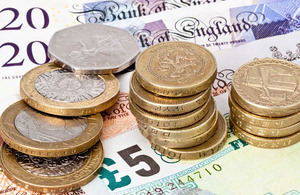Lower Council Taxes and rates for hard-working families and local firms
Eric Pickles has hailed today's Budget for providing lower council taxes and rates for hard-working families and local firms.

Money
The measures announced by Chancellor George Osborne will bring around £1.1 billion of benefits to local people, including:
- a council tax freeze worth up to £70 for the average family
- £175 million refund for hard pressed businesses including some in ports
- confirmation of £390 million in business rate relief for half a million small businesses
Communities and Local Government Secretary Eric Pickles said:
The Budget is good news for hard pressed local businesses and council tax payers who will benefit by up to £1.1 billion. This Budget demonstrates that the new government has kept its promises on council tax and business taxes.
Council tax frozen
The government will work in partnership with local authorities in England to implement a freeze in council tax in 2011 to 2012. This will benefit all households who pay council tax in England as the economy recovers.
Eric Pickles said:
Council tax bills have more than doubled in the last thirteen years while frontline services like bin collections were halved. Rocketing council tax has to stop, to offer real help to struggling families and pensioners.
The new government is delivering on our promise to work with councils and freeze council tax next year - worth up to £70 on a typical Band D home - a real victory for hard-pressed taxpayers.
We will make it possible for local authorities to freeze or reduce their council tax, and still protect vital local services, thanks to this budget commitment, our reduction in Whitehall bureaucracy and new freedoms for councils to spend their money on local priorities.
The government has kept its promise to cancel port taxes
Ministers welcomed confirmation in the Budget of legislation to waive £175 million of backdated business rates demands levied on businesses including some in ports. These unfair, retrospective rates bills threatened to devastate the industry, and cause significant knock-on harm to the manufacturing sector. This could benefit businesses in an estimated 3,000 properties. Alongside this we estimate that ratepayers occupying up to an estimated 700 properties in ports could also benefit from this waiver. The department will look to bring forward primary legislation at the earliest opportunity.
Local Government Minister Bob Neill said:
The dark tax cloud that has been hanging over some port businesses, the backbone of Britain’s export industry, for too long has finally been lifted.
The Chancellor’s decision to waive and repay the unexpected rates bills for those affected port businesses is a victory for common sense. Many companies across the country will be able to move forward confidently, unburdened by these unexpected debts.
In addition to help small businesses rebuild the economy the Budget announced that small business rate relief will be doubled saving over half a million businesses £390 million in taxes.
The level of small business rate relief in England will be temporarily increased for one year, from 1 October 2010. 530,000 businesses in England are expected to benefit, with approximately 345,000 businesses paying no rates.
Bob Neill added:
We need to inject new life into the private sector, so that enterprise can drive recovery and re-build the economy. Today we are helping over half a million small businesses with our low business tax promise that will free them up to compete and grow.
Further information
Council tax in England is currently £1,439 on an average Band D home. Stopping a 5% council tax rise (the last government’s capping threshold in recent years) would save £72 next year.
Stopping a 2.9% rise (the average increase over the last 3 years) would save around £40 on an average Band D home, or around £35 based on the alternative ‘average per dwelling’ measure.
Council tax bills hit £1,439 on Band D in England in 2010 to 2011. By contrast, council tax was £688 in 1997 to 1998. This means council tax has risen 109% - or an extra £751 a year on a Band D home. Since all other Bands are set as a percentage of Band D, every type of home has seen their bill more than double.
Scotland has frozen council tax, England has lost out. Scotland benefited from yet another council tax freeze this year, meaning the average bill for a comparative Band D home in Scotland will be £290 less than south of the border in 2010 to 2011.